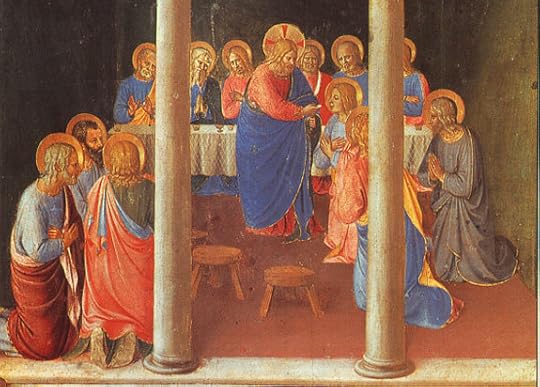Holy Communion as a Matter of Life and Death

Detail from "Communion With the Apostles" (1451-52) by Fra Angelico (Wikiart.org)
Holy Communion as a Matter of Life and Death | Dr. Leroy Huizenga | CWR blog
Canon law and the Church’s eucharistic discipline aren’t exercises in authoritarian concoction but are rooted deeply in sustained reflection on divine revelation
The reception of Holy Communion is currently a topic of great controversy in the Catholic Church. Bishops generally permit politicians who cross Catholic teaching on grave issues in their public words and actions to continue to receive the Eucharist, and Cardinal Walter Kasper has recently proposed permitting civilly divorced and remarried Catholics to receive the Eucharist as well, an idea that will be taken up at the Synod on the Family in October.
Many Catholics are concerned about these issues, as receiving the sacrament under circumstances involving public scandal and objective sin risk making a mockery of the Church’s discipline and the Eucharist itself. Others of a more latitudinarian attitude worry that withholding the Eucharist in such circumstances risks politicizing holy communion or denying the Church’s chief channel of grace to Christians, as the Eucharist the “source and summit of Christian life” (LG 11; CCC 1324).
One one hand, the Church does teach that Catholics have a general right to the sacraments. On the other hand, the Church also teaches that there are situations in which the sacraments are not to be given or received. While I am not a canon lawyer, and would defer to canonists such as Ed Peters on the canonical issues surrounding the giving and receiving of holy communion (see his excellent discussion thereof in his “Fencing the Altar”), the canonical issues seem clear enough. Canon 915 forbids admitting to communion those “obstinately persevering in manifest grave sin”, while Canon 916 enjoins persons “conscious of grave sin” not to receive communion without confession. Canon 915 thus addresses ministers of the sacrament, practically speaking bishops and priests, while canon 916 addresses would-be communicants. Given these canons, many (including Cardinal Raymond Burke, prefect of the Apostolic Signatura and thus the Church’s “Chief Justice,” and Pope Benedict himself) have asserted that politicians defying Church teaching on life issues ought to be denied communion, while Cardinal Kasper’s proposal to “tolerate” but not “accept” second marriages has precipitated a backlash among his fellow Cardinals, none less than Cardinal Gerhard Müller, prefect for the Congregation for the Doctrine of the Faith.
But in an antinomian age in which refusing anyone anything is seen as mean, adverting to canon law feels like legalism to many. And while Catholics of all Christians shouldn’t disparage or disregard canon law, or laws and rules in general (though many do), it may help to go ad fontes and think about Scripture’s witness to the nature of holy communion and its relevance for Eucharistic discipline. For canon law and the Church’s eucharistic discipline aren’t exercises in authoritarian concoction. Rather, they are rooted deeply in sustained reflection on divine revelation.
Carl E. Olson's Blog
- Carl E. Olson's profile
- 20 followers



